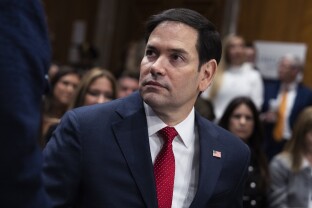The lawyers representing a pro-Palestinian protester in his immigration proceedings told reporters Thursday they want to depose Secretary of State Marco Rubio after he argued to an immigration court that he has the authority to “personally determine” whether any noncitizen can be deported based on their speech.
Mahmoud Khalil, a 30-year-old graduate of Columbia University who acted as a spokesperson and negotiator for student protesters, will appear Friday afternoon in a Louisiana immigration court, where a judge could rule on his removal. His detainment was the first of several high-profile arrests by the federal government, which included international students with histories of pro-Palestinian advocacy.
“The Rubio letter is the only piece of evidence going to the main charge in this case that his presence in the United States could have potentially serious foreign policy consequences,” said Marc Van Der Hout, who serves as counsel to Khalil, referring to a two-page memo Rubio submitted to the immigration court. “We have the right, Mr. Khalil has the right, under due process, to confront the evidence against him, and that’s what we want to examine Secretary of State Rubio about.”
Van Der Hout told reporters that the judge handling Khalil’s immigration case did not seem likely to approve their request, as Van Der Hout said the judge cited immigration courts’ limited jurisdiction in Khalil’s first hearing Tuesday.
“She certainly did not seem open to it. We’ll see where that goes because we have to,” he said.
In the secretary of state’s memo submitted to the court Wednesday afternoon, which was obtained by the Associated Press, Rubio does not allege that Khalil engaged in any criminal activity. The secretary of state argues that Homeland Security investigations concluded Khalil participated in “antisemitic protests and disruptive activities, which fosters a hostile environment for Jewish students in the United States,” which Rubio says is grounds for deportation.
“I have determined that the activities and presence of these aliens in the United States would have potentially serious adverse foreign policy consequences and would compromise a compelling U.S. foreign policy interest,” Rubio writes, citing the 1952 Immigration and Nationality Act, a little-used, Cold War-era authority that he says gives him the power in cases like Khalil’s to determine whether someone should be deported.
In the memo, Rubio said Khalil’s “continued presence” would “undermine U.S. policy to combat anti-Semitism around the world and in the United States, in addition to efforts to protect Jewish students from harassment and violence in the United States.”
A Department of Homeland Security spokesperson told the Associated Press that the government had filed more nonpublic evidence with the immigration court.
Rubio wrote the memo in response to the judge’s demand that the federal government show evidence to justify his removal from the U.S. by Friday. Meanwhile, Khalil’s lawyers argue that his detention and removal would be unconstitutional and that the government has not supplied enough evidence that their client threatened any foreign policy objectives.
Khalil’s counsel said the hearing tomorrow could have implications for the increasing number of foreign students detained after having their visas and green cards revoked based on their alleged support for Hamas.
“We’re set for a hearing where the government will attempt to establish that it’s met its burden to show that it can deport Mahmoud for lawful conduct — conduct that’s protected by the Free Speech Clause of the First Amendment,” said Johnny Sinodis, one of Khalil’s lawyers. “Tomorrow’s hearing has momentous implications. Whether the government can act in violation of the Constitution to deport someone is front and center, and our position is that it cannot.”
In addition to the case playing out in a Louisiana immigration court, Khalil also has counsel representing him in a separate case, a habeas corpus petition in a federal district court in New Jersey, which would offer him more legal protections than the immigration court can, Sinodis told reporters.
“The [immigration] court has to largely accept what the secretary of state has said about Mahmoud and largely defer to the executive’s conclusions about the fact that he is a threat to foreign policy simply because the secretary of state says, without analysis or evidence, that he deems Mahmoud a threat to national security,” Sinodis said. “This is a sort of tacky, Soviet-style diktat that’s equal parts empty and chilling.”
—
Emily Kennard is a NOTUS reporter and an Allbritton Journalism Institute fellow.
Sign in
Log into your free account with your email. Don’t have one?
Check your email for a one-time code.
We sent a 4-digit code to . Enter the pin to confirm your account.
New code will be available in 1:00
Let’s try this again.
We encountered an error with the passcode sent to . Please reenter your email.


